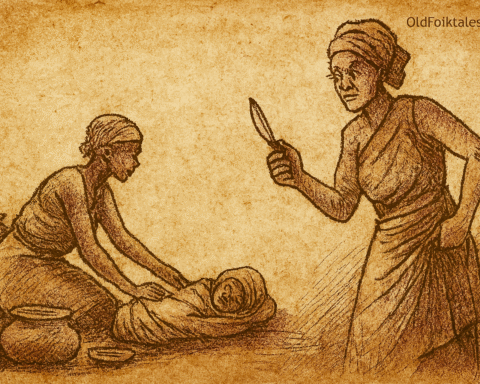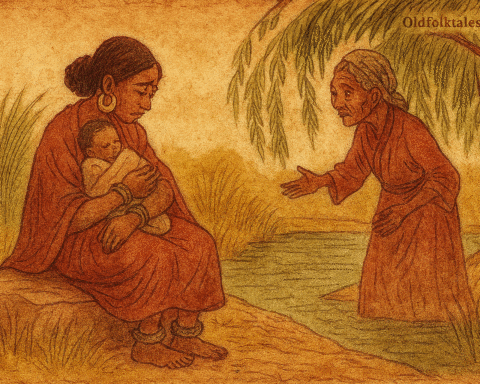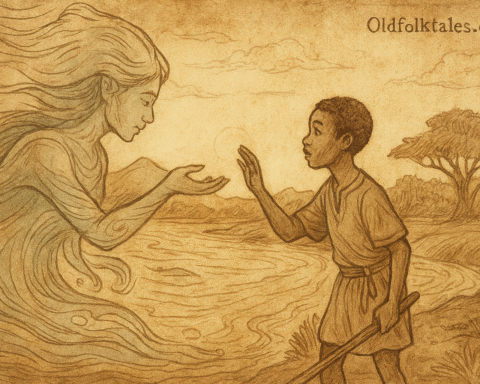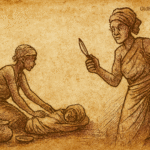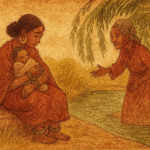Long ago, when the world was still young and the red earth stretched endlessly beneath azure skies, there lived a pig named Ankwunyab who was renowned throughout his village as one of the wealthiest and most industrious members of the community. His vast farms rolled across the fertile valleys like green carpets, heavy with crops that fed not only his own family but much of the surrounding region.
The secret of Pig’s remarkable success, whispered the village elders around evening fires, lay in his enormous appetite. This hunger drove him to tend his fields with unwavering dedication, rising before dawn to work the rich soil and remaining until the last rays of sunlight painted the horizon gold. His hands were permanently stained with earth, his back strong from countless seasons of planting and harvesting, and his barns overflowed with grain that brought prosperity to his compound.
But Pig had a friend whose character stood in stark contrast to his own industrious nature. Torokee-the-Tortoise was as magnificently lazy as Pig was diligently hardworking. While Pig sweated under the merciless sun, Tortoise could be found lounging in whatever shade was available, spinning elaborate tales to explain away his empty fields and barren compound.
Also read: Hawk and Hen’s Broken Friendship
Despite his chronic laziness, Tortoise somehow maintained a lavish lifestyle that mystified the entire village. He was a spendthrift of legendary proportions, squandering resources as quickly as Pig accumulated them. His survival strategy was simple yet audacious, he borrowed constantly from his generous friend, creating an ever-growing mountain of debt that seemed to concern him not at all.
The pattern had continued for years: Tortoise would arrive at Pig’s prosperous compound with elaborate stories of temporary hardship, always promising swift repayment, always leaving with armfuls of grain, tools, or household necessities that somehow never found their way back to their original owner.
On this particular morning, as the compound roosters announced another day of potential productivity, Tortoise arrived with his most ambitious request yet. His demeanor carried the artificial confidence of a practiced borrower as he approached his long-suffering friend.
“My dear Pig,” Tortoise began with honeyed words, “I find myself in need of a considerable sum of money for a most important occasion.”
Pig’s weathered face darkened like storm clouds gathering over the savanna. His patience, worn thin by countless similar requests, finally began to fray at its edges.
“You still owe me the money I lent you last year to celebrate the birth of your child,” Pig began, his voice rising with accumulated frustration. “You haven’t returned the cocoyam seeds I lent you last planting season, or the calabash of palm oil, or the cooking pots, or the cutlass, and here you stand again asking for even more money?”
Tortoise’s expression remained serenely untroubled, as if debt were merely an abstract concept that didn’t apply to creatures of his elevated status.
“My friend,” he replied with practiced earnestness, “my in-laws are coming for an important visit. You understand the requirements of hospitality, I must give them a welcome worthy of our family’s reputation. I would be deeply honored if you would join us as one of my most esteemed guests.”
Despite his mounting irritation, Pig felt his mouth water at the thought of a magnificent feast. The image of himself seated among honored guests, enjoying the finest foods and most respected company, proved irresistible to his social ambitions.
Against his better judgment and the warning voices in his head, Pig consented to the loan, though he gave Tortoise only half the requested amount.
“You have one moon cycle to repay me,” Pig declared firmly, his tone brooking no argument. “This time I mean it, one full cycle of the moon, no more.”
Tortoise accepted the money with effusive gratitude and departed, leaving Pig to wrestle with the familiar mixture of generosity and foreboding that followed every such transaction.
One moon cycle came and went like water flowing over stones. Then another passed, and another, and yet another, but Tortoise’s debt remained as solid and immovable as the ancient baobab trees. Each time Pig made the journey to Tortoise’s compound, he returned empty-handed and seething with frustration, having received the same maddeningly evasive response.
“Why are you bothering me so persistently, oh Friend-of-Mine?” Tortoise would protest with wounded dignity. “Of course I know I owe you money and all those other items you enumerate so repeatedly. I fully intend to repay you, but how can I when you won’t give me sufficient time to harvest and sell my crops?”
Pig’s anger burned hotter each time he heard this familiar refrain, especially since everyone in the village knew that Tortoise had planted only a small patch of sickly crops in the shallow soil near his house. His harvest would barely feed a family of field mice, much less generate income for debt repayment.
Finally, Pig’s patience shattered like a clay pot dropped on stone. His usually calm demeanor transformed into something dangerous and unfamiliar.
“Friend-of-Mine,” he growled, his voice carrying the weight of years of accumulated grievances, “don’t forget that a wise person does not slaughter the hen that lays eggs just because there is a feast to celebrate. You’re behaving like the foolish man who climbed the tree of life and then destroyed the very ladder his kinsmen had built for him.”
Pig’s eyes blazed with righteous fury as he delivered his ultimatum: “I will return in eight days. Make absolutely certain you have my money ready. If you fail to produce what you owe me, you will see for the first time what I am truly made of.”
On the appointed day, Tortoise waited with the serene confidence of a master strategist. When he heard Pig’s distinctive grunting and huffing two compounds away, he calmly lay down on his back and called to his wife.
“Quickly,” he instructed, “use my shell as a grinding stone for your spices. When Pig arrives, say nothing to him, absolutely nothing. Go about your cooking tasks as if he were invisible. No matter what he says or does, ignore him completely.”
Tortoise then pulled his head and limbs into his shell, transforming himself into what appeared to be nothing more than an ordinary grinding stone.
When Pig arrived, bristling with righteous indignation, he was greeted by Mrs. Tortoise’s deliberately sour expression. She concentrated on her task with theatrical intensity, grinding spices against her husband’s shell while completely ignoring Pig’s increasingly agitated presence.
“Gro gro gro gro” went the rhythmic sound of grinding, each repetition designed to drive Pig toward the breaking point.
“Are you deaf?” Pig finally exploded, his voice cracking with rage. “Am I not speaking to you? Where is your husband? He knew to expect me today. I’m wasting precious time repeating myself while you just grind pepper as if I don’t exist!”
Mrs. Tortoise maintained her stubborn silence, following her husband’s instructions with perfect precision.
Completely exasperated and no longer thinking clearly, Pig grabbed what he believed to be an ordinary grinding stone and hurled it violently into the plantain bushes behind the house.
Moments later, Tortoise emerged from the vegetation, casually shaking leaves from his shell as if he had just returned from a pleasant stroll. He entered his compound wearing an expression of innocent surprise at finding his wife weeping and a furious pig standing near their fireplace.
“Tegheh kwu! Dead-Father-of-Mine!” Tortoise exclaimed, addressing his wife while pointedly ignoring Pig. “Am I dead, or are you praying for my death, Wife?”
Through her carefully rehearsed sobs, Mrs. Tortoise explained how Pig had disrupted her cooking by violently throwing away her grinding stone, making it impossible to prepare their evening meal.
“I had no intention of throwing away any stone,” Pig protested, his confusion evident. “I asked repeatedly where you were, but she refused to answer.”
Tortoise turned to his unexpected visitor with exaggerated courtesy. “Here I am, dear friend. I apologize that my wife neglected her duties as a hostess, her mother certainly taught her better manners. Please sit down and tell me what brings you here.”
“I want my money,” Pig stated in a voice flat with exhausted patience.
To Pig’s utter amazement, Tortoise examined him with a long, thoughtful look and then burst into delighted laughter, as if he had just heard the most amusing joke in the history of the world.
“So I am supposed to die of hunger because you want your money?” Tortoise chuckled. “My wife cannot cook food in her own home because you demand immediate repayment? How remarkable! Here I was, running home with your exact payment, I’ve been hurrying for the past hour to arrive before you did. I arrive only to find you abusing my poor wife!”
Tortoise’s expression shifted to one of magnanimous forgiveness. “My dear friend, I will overlook this serious insult this one time. However, if you truly want your money returned, you must first find and restore my wife’s grinding stone.”
With that pronouncement, Tortoise strolled calmly to his sleeping mat, leaving Pig standing dumbfounded beside the cold fireplace.
Pig knew from years of friendship that Tortoise never bluffed when it came to his elaborate schemes. But how could he afford to lose fifty pounds over a simple grinding stone? With no other choice available, he began his search.
And so it is that from that day to this, pigs have been rooting in the earth with their snouts, still searching desperately for Mrs. Tortoise’s missing grinding stone, hoping to recover their lost wealth through endless digging.
Moral Lesson
This folktale teaches us about the consequences of both excessive generosity without wisdom and cleverness used for dishonest purposes. Pig’s inability to set firm boundaries enabled Tortoise’s parasitic behavior, while Tortoise’s cunning ultimately created a trap for the very friend who had supported him. It reminds us that healthy relationships require balance, honesty, and mutual respect, without these foundations, even the cleverest schemes can destroy the bonds that matter most.
Knowledge Check
Q1: What does Pig’s character represent in this African folktale’s moral framework? A: Pig represents the hardworking, generous person whose kindness is exploited by others. His character demonstrates both the virtue of industry and the potential danger of enabling others’ irresponsible behavior through excessive generosity without boundaries.
Q2: How does Tortoise’s trickster role reflect traditional African storytelling? A: Tortoise embodies the classic African trickster archetype, clever, cunning, and morally ambiguous. His ability to manipulate situations through wit rather than strength reflects the traditional African belief that intelligence can overcome physical disadvantages, though not always ethically.
Q3: What cultural significance does the grinding stone hold in this story? A: The grinding stone represents essential domestic life and women’s work in traditional African society. By making Pig responsible for replacing this crucial household tool, Tortoise cleverly shifts blame while highlighting the importance of basic necessities for family survival.
Q4: Why does this folktale explain pigs’ rooting behavior through debt and trickery? A: This etiological tale transforms natural animal behavior into a moral lesson about consequences. By explaining pigs’ digging as eternal searching for something lost through deception, the story makes their behavior a visible reminder of how cleverness misused can create endless problems.
Q5: What role do traditional proverbs play in establishing the story’s moral authority? A: Proverbs like “don’t slaughter the hen that lays eggs” and the tree of life metaphor provide cultural wisdom that frames Pig’s warnings. These traditional sayings give moral weight to his frustration and foreshadow the consequences of Tortoise’s behavior.
Q6: How does Mrs. Tortoise’s cooperation in the deception reflect family loyalty themes? A: Mrs. Tortoise’s participation in her husband’s scheme demonstrates the African cultural value of family solidarity, even in morally questionable situations. Her loyalty shows how family bonds can sometimes override individual ethical considerations, adding complexity to the moral lesson.

